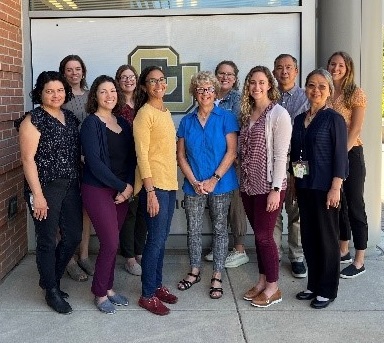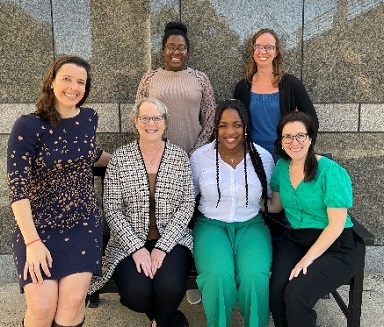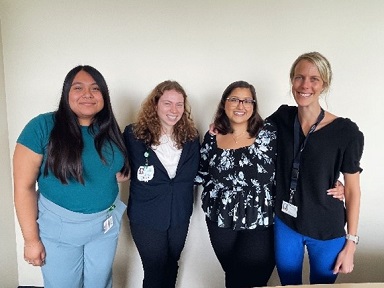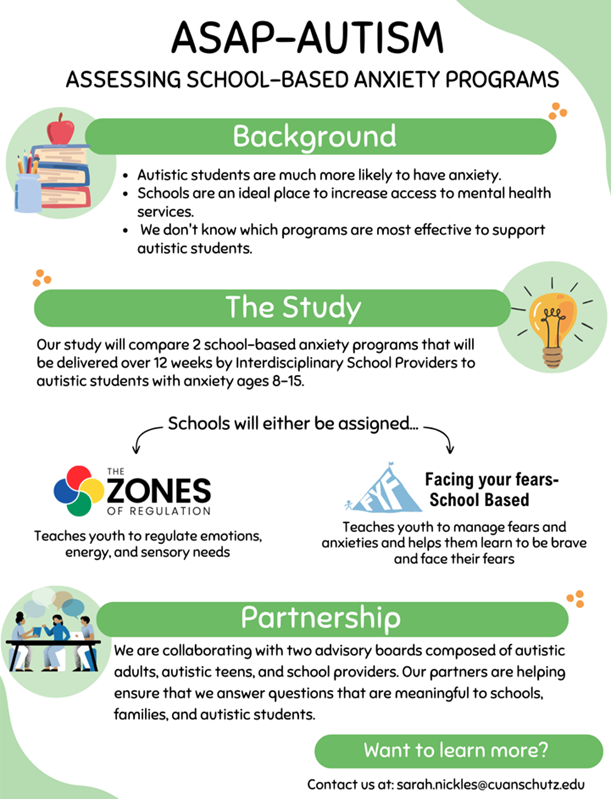Research, Evidence Base, & Publications

Evidence Base for Facing Your Fears (FYF)
Clinic-Based Treatment Trials
Six treatment trials on FYF have been published, including a pilot study for autistic adolescents, a telehealth adaptation of FYF, a randomized trial, and a multi-site treatment trial (Hepburn et al., 2016; Reaven et al., 2009; 2012a; 2012b; 2014; 2018). The results of all six studies indicated that autistic children and teens demonstrated significant reductions in anxiety following participation in FYF. A seventh trial was recently completed and involved the adaptation of FYF for autistic adolescents with Intellectual Disability (ID), in addition to anxiety (Blakeley-Smith et al. 2021). Similar to our other pilot efforts, participants demonstrated significant decreases in parent-reported anxiety symptoms for their teens with autism and ID.
Implementation trials
In our initial implementation efforts, outpatient clinicians (e.g., clinical psychologists, interns, post-doctoral fellows) working with autistic children and adolescents, but new to FYF, delivered the treatment with excellent fidelity and youth displayed significant reductions in anxiety according to parent report (Reaven et al. 2014).
In a second, but more extensive implementation trial, the purpose was to examine optimal training methods for delivering FYF. In this multi-site treatment trial, clinicians were assigned to three different training conditions: Manual only, Workshop only, and Workshop Plus ongoing consultation.
Clinicians delivered FYF with excellent fidelity and significant reductions in anxiety symptoms were apparent for all conditions. Significant reductions in generalized anxiety, social anxiety, and specific phobias occurred across conditions. Overall, results indicated that there may be an advantage to the Workshop/Workshop Plus conditions compared with the Manual-only condition (Reaven et al. 2018), as clinicians in the Workshop conditions delivered the intervention with better quality compared with clinicians in the Manual condition (Reaven et al. 2018). More than 200 autistic youth and anxiety have participated in our research involving clinic-based FYF.
Research groups outside of JFK Partners/University of Colorado Anschutz Medical Campus have begun to research the FYF program. For example, Solish and colleagues (2020) conducted a community effectiveness study across six community-based agencies. Over 100 autistic youth participated in the study. Results indicated that significant improvements in anxiety were apparent for participating youth (Solish et al. 2020).
Facing Your Fears in Schools (FYF-S; Reaven & Blakeley-Smith, 2024)
In efforts to maximize the acceptability, feasibility, sustainability, and contextual fit of a school-based version of FYF, community members were engaged via qualitative methodology (focus groups) and asked to provide input on adapting FYF for school settings. Focus group participants included potential end users of FYF-S (e.g., interdisciplinary school providers such as special educators, school psychologists, and speech/language pathologists), as well as caregivers of autistic children with anxiety. The completion of 14 focus groups (n=40), resulted in the manualized FYF-S program (Reaven et al. 2019).
Evidence for FYF-S
We initially collaborated with the Singapore Ministry of Education (MOE) to adapt FYF for schools. Following an in-depth collaboration with the MOE, educators in schools in Singapore delivered FYF-S to autistic students ages 13-15 years with anxiety. Results supported feasibility and significant reductions in anxiety were noted (Drmic et al., 2017).
A more robust version of FYF-S was developed as described above, and the results of the pilot feasibility study conducted in Colorado indicated that FYF-S is feasible, acceptable, and effective (Reaven et al., 2021). A clustered randomized trial was conducted following the pilot trial and results indicated that school providers continued to deliver FYF-S with good fidelity and students in FYF-S demonstrated greater reductions in anxiety compared to students who were randomly assigned to usual care (Reaven et al. 2024).
Facing Your Fears:IDD
Through funding from the Organization of Autism Research, we conducted a pilot study to adapt the FYF program to meet the cognitive, communication, and behavioral needs of autistic adolescents with ID and to understand its preliminary efficacy (Blakeley-Smith et al., 2022). FYF:IDD was successfully adapted and manualized via an iterative process incorporating stakeholder feedback and determined to be feasible and acceptable to families.
Preliminary outcome measures indicated significant improvements in anxiety and mood symptoms, in addition to significant reductions in specific phobias, and lethargy/social withdrawal. In 2021, we were awarded a Department of Defense Autism Research Program’s Clinical Translational Research Award and we recently completed a 3-year randomized clinical trial of FYF:IDD. Results to follow.
Ongoing research studies
We are currently conducting a multi-year comparative effectiveness trial funded by the patient-centered outcomes research institute (PCORI). In this study, participating elementary and middle schools across Colorado and North Carolina are randomly assigned to deliver either FYF-S or Zones of Regulation to students with autism and anxiety. We are interested in learning more about what type of school-based intervention program works best for which students. Stay tuned for updates!

Research Team at the University of Colorado Anschutz Medical Campus

Our research partners at the University of North Carolina, Chapel Hill

Our research partners at Emory University School of Medicine

Selected FYF Publications
Hepburn, S.L., Blakeley-Smith, A., Wolff, B. & Reaven, J. (2015). Telehealth delivery of cognitive-behavioral intervention to youth with autism spectrum disorder and anxiety: A pilot study. Autism, 20(2), 207-218. https://doi.org/10.1177/1362361315575164
Meyer. A.T., Moody, E., Keefer, A., O’Kelley, S., Duncan, A., Blakeley-Smith, A., & Reaven, J. (2020) Effect of co-occurring psychiatric disorders on treatment of children with autism spectrum disorder and anxiety. Journal of Autism and Developmental Disorders, 53, 567-579. https://doi.org/10.1007/s10803-020-04540-1
Pickard, K., Blakeley-Smith, A., Boles, R., Duncan, A., Keefer, A., O’Kelley, S., & Reaven, J. (2020) Examining the sustained use of a cognitive behavioral therapy program for youth with autism spectrum disorder and co-occurring anxiety. Research in Autism Spectrum Disorders, 73. https://doi.org/10.1016/j.rasd.2020.101532
Reaven, J., Blakeley-Smith, A., Beattie, T. L., Sullivan, A., Moody, E. J., Stern, J. A., Hepburn, S. L., & Smith, I. M. (2014). Improving transportability of a cognitive-behavioral treatment intervention for anxiety in youth with autism spectrum disorders: Results from a US–Canada collaboration. Autism, 19(2), 211-222. https://doi.org/10.1177/1362361313518124
Reaven, J., Blakeley-Smith, A., Culhane-Shelburne, K., & Hepburn, S. (2012a). A randomized trial: Group cognitive behavior therapy for children with high-functioning autism spectrum disorders and anxiety. Journal of Child Psychology and Psychiatry, 53(4), 410-419. https://doi.org/10.1111/j.1469-7610.2011.02486.x
Reaven, J., Blakeley-Smith, A., Leuthe, E., Moody, E., & Hepburn, S. (2012b). Facing your fears in adolescence: cognitive behavior therapy for high-functioning autism spectrum disorders and anxiety, Autism Treatment and Research, 2012, 1-13. https://doi.org/10.1155/2012/423905
Reaven, J., Blakeley-Smith, A., Nichols, S., Dasari, M., Flanigan, E., & Hepburn, S. (2009). Cognitive-behavioral group treatment for anxiety symptoms in children with high-functioning autism spectrum disorders: a pilot study. Focus on Autism and Other Developmental Disabilities, 24, 27-37. https://doi.org/10.1177/1088357608327666
Reaven, J., Moody, E., Klinger, L., Keefer, A., Duncan, A., O’Kelley, S., Meyer, A., Hepburn, S., & Blakeley-Smith, A. (2018). Training clinicians to deliver group CBT to manage anxiety in youth with ASD: Results of a multi-site trial. Journal of Consulting and Clinical Psychology, 86(3), 205-217. https://doi.org/10.1037/ccp0000285
Walsh, C. E., Moody, E., Blakeley-Smith, A., Duncan, A., Hepburn, S., Keefer, A., Klinger, L., Meyer, A., O’Kelley, S., & Reaven, J. (2018). The relationship between treatment acceptability and youth outcome in group CBT for youth with ASD and anxiety. Journal of Contemporary Psychotherapy, 48, 123-132. https://doi.org/10.1007/s10879-018-9380-4
Selected FYF-S Publications
Drmic, I., Aljunied, M., & Reaven, J. (2017). Feasibility, acceptability and preliminary treatment outcomes in a school-based CBT intervention program for adolescents with ASD and anxiety in Singapore. Journal of Autism and Developmental Disorders, 47, 3909-3929. https://doi.org/10.1007/s10803-016-3007-y
Pickard, K., Maddox, B., Boles, R., & Reaven, J. (2024). A cluster randomized controlled trial comparing the effectiveness of two school-interventions for autistic youth with anxiety. BMC Psychiatry, 24(6), 1-12. https://doi.org/10.1186/s12888-023-05441-0
Reaven, J., Meyer, A.T., Pickard, K., Boles, R., Hayutin, L., Middleton, C., Reyes, N., Hepburn, S., Tanda, T., Stahmer, A., & Blakeley-Smith, A. (2021). Increasing access and reach: Implementing school-based CBT for anxiety in students with ASD or suspected ASD. Evidence-Based Practice in Child and Adolescent Mental Health, 7(1), 56-75. http://dx.doi.org/10.1080/23794925.2021.1941430.
Reaven, J., Pickard, K., Meyer, A., Hayutin, L., Middleton, C., Reyes, N., Tanda, T., Stahmer, A., Blakeley-Smith, A., & Boles, R. (2024). Implementing school-based CBT for anxiety in students with autism or suspected autism via a train-the-trainer approach: results from a clustered randomized trial. Autism, 28(2), 484-497. https://doi.org/10.1177/13623613231175951
Reyes, N., Pickard, K., Morris, M., Tanda, T., & Reaven, J. (2021). Identifying and understanding anxiety in youth with ASD: Parent and school provider perspectives on anxiety within public school settings. Evidence-Based Practice in Child and Adolescent Mental Health, 7(1), 12-23. https://doi.org/10.1080/23794925.2021.1917017
Reaven, J., Reyes, N., Pickard, K., Tanda, T., & Morris, M. A. (2020). Addressing the needs of diverse youth with ASD and anxiety in public schools: Stakeholder input on adaptations of clinic-based Facing Your Fears. School Mental Health, 12(2), 308-322. https://doi.org/10.1007/s12310-019-09351-z
Rosen, T. E., Pickard, K., Ponomaryova, A., Kerns, C. M., & Reaven, J. (2022). From clinic to classroom: Two case studies of youth with ASD and anxiety from the school-based Facing Your Fears program. Journal of Cognitive Psychotherapy, 36(1), 24-41. https://doi.org/10.1891/JCPSY-D-20-00051
Selected FYF IDD Publications
Blakeley‐Smith, A., Meyer, A. T., Boles, R. E., & Reaven, J. (2021). Group cognitive behavioural treatment for anxiety in autistic adolescents with intellectual disability: A pilot and feasibility study. Journal of Applied Research in Intellectual Disabilities, 34(3), 777-788. https://doi.org/10.1111/jar.12854